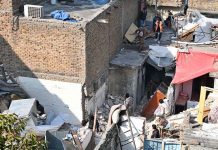By Ali Imran
ISLAMABAD: Pakistan Telecommunication Authority (PTA) Chairman Major General (R) Amir Azeem Bajwa Sunday said the authority was helping the country in pursuing its goal of uplifting vulnerable segments of the society through modern day information and communication technologies (ICTs).
In a message on World Telecommunication and Information Society (WTIS) Day, being observed on May 17, he said, Pakistan’s telecom sector had become a role model for other sectors in reshaping the economic destiny of the people. “The sector will continue to play an important role in the current decade towards attainment of SDGs,†he added.
The chairman said the significance of ICT networks had never been as pronounced and vital to our safety, well-being and for stimulating economic growth as were during the coronavirus (COVID-19) crisis.
The PTA, he said, had been successfully playing its role supplementing government’s efforts by effectively leveraging digital technologies for public awareness, checking the spread of COVID-19 through trace, track and quarantine (TTQ), facilitating funds disbursement to needy through Ehsaas Programme, and arranging public donations in Prime Minister’s COVID-19 Relief Fund through short messaging service (SMS).
Bajwa said the PTA was committed to continue its efforts to maintain support for consumers and businesses and to ensure that networks remained resilient and quality elecommunication services were available to all especially in these times. He said, “We are fully committed to make the best use of ICTs for a sustainable future and to create a stronger, united and connected Pakistan and global community.â€
The WTIS Day is being celebrated on May 17, and theme for this year – “Connect 2030: ICTs for the Sustainable Development Goals (SDGs)†holds special significance for the world and Pakistan.
Regarding this year’s World Telecom Day theme, the PTA chairman said, “I feel happy to mention that the PTA is doing its utmost efforts alongside other stakeholders in supporting SDGs by bridging the digital divide and bringing economic and social benefits of the mobile and internet to rural communities.â€




